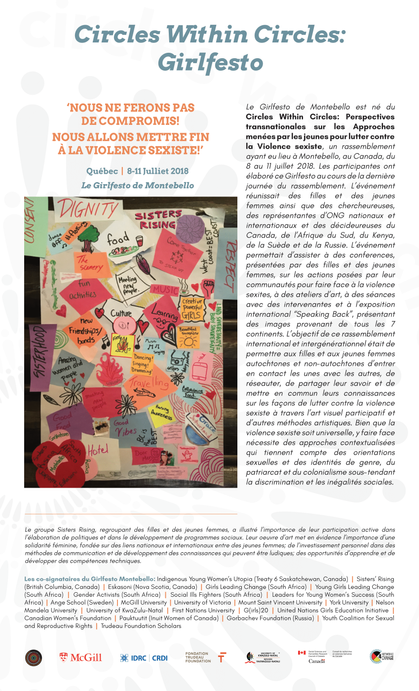- The Girlfesto -
The Girlfesto
The Girlfesto is a protest text, that acts as medium for speaking back. Girls and women are collectively demanding their liberation from a world where Sexual and Gender-Based Violence (SGBV) exists. The Girlfesto communicates an urgent need for recognition of the severity of this issue, and actionable steps to end SGBV. This text represents healing, safety, freedom, bravery, and community.
In 2018, various activists came together to create the Girlfesto, which has now been translated into 9 different languages. We encourage you and your local community to get together and write your own Girlfesto.
A Note on Language
"To make policies accessible (through public digital and
physical spaces and using language that is easily understood)"
- The Girlfesto, 2019
The Girlfesto was first produced in English and is being translated into the various languages of the communities and countries of the girls and young women who co-authored it at Circles Within Circles and additional languages for other girls globally. From Canada and South Africa the Girlfesto has been translated in various Indigenous Languages; Inuktitut, isiZulu, Kanien'kéha, Xhosa. The Girlfesto is also available in Afrikaans, French, Russian and Swedish. Girls must have access to information in their preferred languages. Translating the Girlfesto responds to this call to action and is being done in the spirit of decolonization and in support of language revitalization. It is also essential to recognize the colonial imposition of the English language and the historic criminalization and forced loss of many Indigenous languages. Translating the Girlfesto into different Indigenous languages is a practice of language revitalization and decolonization and it makes the document more culturally relevant to different Indigenous communities. We encourage you to contact us if you would like to have the Girlfesto translated into a different language.
to access and download these pdfs, you can visit the Networks for Change website here.
Afrikaans
Afrikaans is a language spoken in South Africa, Namibia and, to a lesser extent, Botswana and Zimbabwe. Afrikaans evolved from Dutch being spoken by the colonizers/settlers of South Africa. Jade Blume did the translation of the Girlfesto into Afrikaans, a language spoken by many people in the Eastern Cape of South Africa, in this way extending the reach of the work of the Girls Leading Change and the Young Girls Leading Change into communities.
French
French is the official language of Québec, where the Girlfesto was first created and is Canada’s second official language. French is the official language of Québec, because the French colonized the area. The French translation was provided by Caroline Poudrier, Montreal, to ensure the Girlfesto is accessible to our French speaking community stakeholders, partners and funders, located in the province of Quebec and beyond.
isiZulu
Zulu, or isiZulu, is an Indigenous language of the Nguni branch spoken in Southern Africa. It is the language of the Zulu people, with about 12 million native speakers, who primarily inhabit the province of KwaZulu-Natal of South Africa. IsiZulu is one of the most widely spoken of the eleven official languages of South Africa as both a first and additional language
The Girlfesto was translated into isiZulu by Dr Nokukhanya Ngcobo (a member of the Networks for Change) and Mr Njabulo Manyoni. both are isiZulu language specialists at the University of KwaZulu-Natal. The isiZulu version of the Girlfesto has made this important document more accessible to large numbers of South Africans, particularly in KwaZulu-Natal where the Leaders for Young Women’s Success and the Social Ills Fighters are based.
Russian
Russian is an East Slavic language, which is an official language in Russia, Belarus, Kazakhstan, Kyrgyzstan, as well as being widely used throughout Eastern Europe, the Baltic states, the Caucasus and Central Asia. The Girlfesto was translated by Olga Zdravomyslova and Elena Iarskaia-Smirnova, collaborators of Girlhood Studies projects in Russia. Soon after Olga and Elena returned to Russia following their attendance at Circles Within Circles, they translated the Girlfesto and shared it with the girls involved in projects through the Gorbachev Foundation.
English
English is the most widely spoken language worldwide with about 1.5 billion speakers, this is largely the result of the colonial imposition of the English across the globe. For many of the girls attending Circles Within Circles, English is their first language because colonialism has prevented them and their communities from accessing and learning their own languages. The original Girlfesto was initially drafted in English by the youth participants, community scholars, practitioners, activists and researchers in attendance at Circles Within Circles.
Inuktitut
Inuktitut, is one of the principal Inuit languages. It is spoken in Nunavut, the Northwest territories and all areas north of the tree line, including parts of the provinces of Newfoundland and Labrador, Quebec and to some extent in northeastern Manitoba. The Girlfesto was translated by Eileen Kilabuk-Weber, Edmonton, to serve Inuit stakeholders across Canada, including the Networks for Change girl's group in Rankin Inlet, Nunavut.
Kanien'kéha
Kanien'kéha is the language of the Kanien'kehá:ka people. The Girlfesto was translated by Wilhelmina Beauvais, from Kanehsatake, with a view to making the Girlfesto accessible to the Kanien'kehá:ka Indigenous communities of Tiohtià:ke (Montreal), where the project administration team is based.
Swedish
Translated by Emelie Larsson in recognition of Monica Stenberg and the girls that joined us at Circles Within Circles from Bobergsgymnasiet Ånge, Sweden. These girls continue their youth-led work to address GBV in collaboration with Mid Sweden University through the T-Gran: A Transnational Study of the Intersections of Rurality, Gender and Violence Against Girls and Young Women project.
isiXhosa
Xhosa, also isiXhosa, is an Indigenous language and is one of the official languages of South Africa and Zimbabwe. Dr Thoko Batyi translated the Girlfesto into isiXhosa, the main Indigenous language spoken in the Eastern Cape of South Africa where the Girls Leading Change and the Young Girls Leading Change continue doing their participatory work.

















